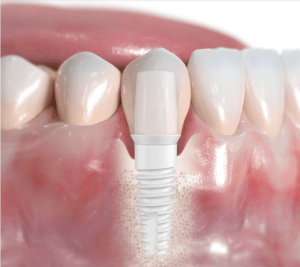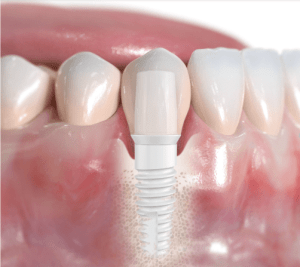Are you considering a dental implant? Or maybe you already have one (or several)? If so, it is important to understand how to prevent peri-implantitis, a condition that may occur in individuals with implants. Just as gum disease can occur around a natural tooth, similar inflammation can occur around a dental implant, making oral hygiene, prevention, and early detection vital for implant longevity and your overall health.
What is Peri-implantitis?
Left untreated, the build-up of bacterial plaque can cause periodontitis, also known as gum disease. Similarly, peri-implantitis involves the build-up of bacterial plaque around an implant, causing inflammation and eventual bone loss. When detected early, peri-implantitis is manageable, and the implant can often be maintained. However, severe cases causing bone loss may eventually cause implant failure.
Symptoms and Risk factors
Signs of peri-implantitis resemble gum disease symptoms. These signs include red and tender gums around the implant, swelling, and/or bleeding when brushing or flossing. Like natural teeth, implants require regular brushing, flossing, and routine check-ups for maintenance and plaque control.
Individuals at higher risk for peri-implantitis include those who do not maintain the hygiene protocol recommended by their oral health professional. Other risk factors include previous periodontitis, systemic diseases like diabetes, smoking, and vaping.
How to Prevent Peri-Implantitis
 If you have an implant, you’ve already made an important investment in your oral, and overall, health and well-being. So it is crucial to be proactive in protecting the health of your implant to prevent or manage peri-implantitis.
If you have an implant, you’ve already made an important investment in your oral, and overall, health and well-being. So it is crucial to be proactive in protecting the health of your implant to prevent or manage peri-implantitis.
To prevent peri-implantitis, make sure you are closely adhering to your home care hygiene protocol. This includes flossing around the implant, just like you would with a natural tooth. Also, make sure you attend your regular dental hygiene appointments. These steps will help ensure the longevity of your implant.
If you notice any oral inflammation or bleeding, it is important to seek treatment as soon as possible. Schedule an appointment even if it is not time for your regularly scheduled check-up so that your oral health professional can detect any underlying issues and get you started on a treatment program to lower the risk of disease progression.
Finally, in severe cases of peri-implantitis, the implant may need to be removed and replaced. However, consistent and thorough at-home hygiene habits, regular visits, and attention to early warning signs will help prevent the implant from having to be replaced in the first place. Read more here and here about steps you can take to promote the long-term success of your implant, and find out we can use laser therapy to treat peri-implantitis here.
Have questions or concerns? Give us a call at 919-518-8222. We are happy to help.

For more information on this topic, listen to the Gum Guru Podcast by clicking the link below:
